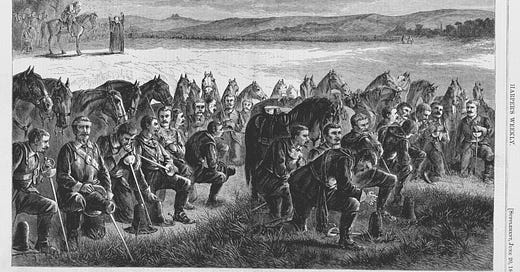Francis Makemie wasn’t the only Scot from that small Irish town. King James the First, about fifty years before, had given that land to many Scottish settlers. They were honest and good in their dealings; they worshipped their God, grew lovely fruits, vegetables, and flowers, and kept out of trouble. But when Charles the Second came to the throne, shortly after Makemie’s birth, he swore that he would make all Presbyterians Episcopalians.
By the use of arms, the Presbyterians were driven from their homes en masse and fled into the hills and valleys. There in the high and low places, upon grass and jagged rock, they met for public worship. The Lord was worshipped in a simple, yet regulated, form; there was the reading and preaching of the Word, the offering up of prayer, and the singing of psalms.
But Charles’ men came with hate and met them there to cut them down. The riders stayed on their horses as they sliced and shot. No discrimination was given; women and children were slaughtered as well as the men. Though the persecution was hot and struck the anvil, they did not give in. In this time of refining, they lifted the blue banner of their fathers that read in gold letters, “For Christ’s Crown and Covenant”.
Though temporary aid came through the reign of William of Orange in England, the persecution resumed after his death. Presbyterians were forbidden to marry under English law, their schools were closed, and their vocations were actively snuffed out by the crown. Europe was a home no longer. To America they would go and to America they went.
Thus followed the largest immigration from Europe to America before the advent of the steamboat. In the same year Makemie came to America, the exodus began, and the ever-so flourishing branch of South Carolina Presbyterianism became a shoot.
There was an attempt by a group of 1,200 Scots to establish a colony in the present location of the Panama Canal, but failed to a lack of food. A Presbyterian minister , Archibald Stobo, stopped in Charles Town, South Carolina on the way back to Scotland. Whilst in the city, a great tempest came and shattered the ship, having it dissolve into the sea. Stobo, being stranded, was coaxed by the members of the White Meeting House to become their pastor. He labored hard for Christ, and 13 years later was apart of the founding of “the old Presbytery of South Carolina”.
These South Carolina Presbyterians planted churches in the Mississippi Valley, Florida, and Alabama. They had with them only their missionary documents: the Bible, the Psalter, and the Westminster Standards.
This mass exodus included 600,000 Presbyterians who would set up churches, schools, and communities in the colonies. Their children would make up one-fourth the population of the time of the American Revolution.
There is a reason why in England, during the war, they called it, “the Presbyterian revolt”…





